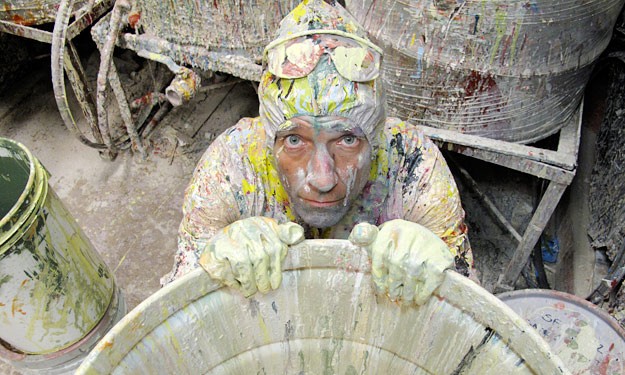For eight years he explored the American workforce, “looking for people who aren’t afraid to get dirty,” offering to take their jobs for a day. He’s been a fish gutter, a horse breeder, a sewer inspector, a roadkill remover, an oyster shucker, an owl vomit inspector, a shark suit tester, and a septic tank technician. The dirtier, the humbler, the more unpleasant the better. His name is Mike Rowe, and this was his job—bringing to light all the “hard-working men and women who earn an honest living doing the kinds of jobs that make civilized life possible for the rest of us.”
“Now, get ready to get dirty!”
Each of the 169 episodes of Dirty Jobs began with the same cheeky warning: a corny preamble that was unintentionally profound. To the thousands of viewers comfortably and cleanly seated in living room recliners, it highlighted the show’s irony—dirty work was their clean leisure, effortlessly enjoyed, safe and spotless. To a millennial generation with idealistic (and some might say narcissistic) world-bettering career ambitions, it offered something more solemn—a reminder that a career is not always a perfect correspondence of passion, drive, and talent with the world’s greatest needs. Sometimes work is not a glorious giving-back; sometimes it’s just a dirty take-what-you-can-get.
This is a valuable reminder. Our labor has dignity, of course, but it remains labor under a curse: “Because you listened to your wife and ate from the tree of which I had forbidden you to eat, cursed be the ground because of you! In toil shall you eat its yield all the days of your life. . . . By the sweat of your face shall you get bread to eat, until you return to the ground, from which you were taken; for you are dirt, and to dirt you shall return.” (Gen 3:17-19) “Now, get ready to get dirty!”
The curse of labor’s toil actually helps us discover the true dignity it possesses. God does not curse evil acts—they are a curse unto themselves. On the rare occasion He does curse, He curses good and powerful things: giving birth and earning a living. Why? Probably because it is the greatest of goods that oft make for idols. The moment you are most God-like, the moment you bring life into the world, or provide for your family, is the moment God reminds you of your place. “You are dirt, and to dirt you shall return.” Pain and toil, the curse is a check on our pride.
Giving birth is obviously quite grand and momentous, but what really makes work so great? The answer, it seems, lies in how work relates to God. Strange to say, but in both kinds of labor, the child-bearing and the bread-winning varieties, we do act somewhat divine: Giving birth imitates God in creating; working for a living imitates God in governing and providing for his creation.
It is odd to think, but God could have created the cosmos to be governed only by himself, with no need for labor. Every man could have received his sustenance, his shelter, and his education directly from Him. Instead he gave us the dignity of sharing in his providence, providing for ourselves and for each other. This is the reason any job that contributes to the common good, however hidden, dirty, disgusting, or toilsome it might be, possesses a great dignity. By your work, you are a minister of divine providence.
Your work is dignified, not because it is glamorous and world-changing, but because by it you are a servant of God. It doesn’t matter if you inspect sewers, remove roadkill, or shuck oysters for a living. Placed in God’s service, your work is dignified.
You may not build a Fortune 500 company or save lives with your scalpel, but no matter. In the end, all wealth and all health restored will pass away anyway. And when to dirt we all return, perhaps we’ll find that dirty jobs had a special way of preparing us for that day. When Our Lord comes in glory, perhaps we’ll find that sewer inspectors, roadkill removers, and oyster shuckers will be the first to inherit the earth.
✠
Image: Mike Rowe from Dirty Jobs







